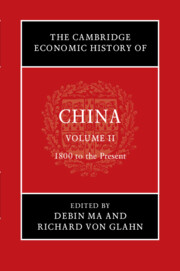Book contents
- The Cambridge Economic History of China
- The Cambridge Economic History of China
- The Cambridge Economic History of China
- Copyright page
- Contents
- Figures
- Maps
- Tables
- Contributors to Volume II
- Acknowledgments
- Note on Citations
- Introduction to Volume II
- Part I 1800–1950
- 1 Ideology and the Contours of Economic Change
- 2 Economic Transition in the Nineteenth Century
- 3 Agriculture
- 4 Handicraft and Modern Industries
- 5 The State and Enterprises in Late Qing China
- 6 State Enterprises during the First Half of the Twentieth Century
- 7 Money and the Macro-economy
- 8 Public Finance
- 9 Financial Institutions and Financial Markets
- 10 Chinese Business Organization
- 11 The Economic Impact of the West
- 12 Foreign Trade and Investment
- 13 Transport and Communication Infrastructure
- 14 Education and Human Capital
- Part II 1950 to the Present
- Index
- References
3 - Agriculture
from Part I - 1800–1950
Published online by Cambridge University Press: 07 February 2022
- The Cambridge Economic History of China
- The Cambridge Economic History of China
- The Cambridge Economic History of China
- Copyright page
- Contents
- Figures
- Maps
- Tables
- Contributors to Volume II
- Acknowledgments
- Note on Citations
- Introduction to Volume II
- Part I 1800–1950
- 1 Ideology and the Contours of Economic Change
- 2 Economic Transition in the Nineteenth Century
- 3 Agriculture
- 4 Handicraft and Modern Industries
- 5 The State and Enterprises in Late Qing China
- 6 State Enterprises during the First Half of the Twentieth Century
- 7 Money and the Macro-economy
- 8 Public Finance
- 9 Financial Institutions and Financial Markets
- 10 Chinese Business Organization
- 11 The Economic Impact of the West
- 12 Foreign Trade and Investment
- 13 Transport and Communication Infrastructure
- 14 Education and Human Capital
- Part II 1950 to the Present
- Index
- References
Summary
For over two millennia, China has sustained the largest single human society on the planet through the development of one of the most sophisticated agrarian systems in history. Even until quite recent, agriculture occupied a central place in the Chinese economy, commanding a dominant 60 to 70 percent of the total economy throughout. Agricultural institutions define the Chinese economic system and agricultural production drove long-run economic change or growth in China. Agriculture was at the center of the Great Divergence debate. Agricultural harvest or failures sometimes spelled the rise and fall of dynasties throughout history. Moving to the modern era, Chinese agriculture became the scapegoat for China’s modernization failure and was regarded as the incubator for Communist revolution. However, given its overriding importance, research on modern Chinese agriculture has been surprisingly understudied for the last few decades.
Keywords
- Type
- Chapter
- Information
- The Cambridge Economic History of China , pp. 87 - 123Publisher: Cambridge University PressPrint publication year: 2022
References
Further Reading
- 2
- Cited by

